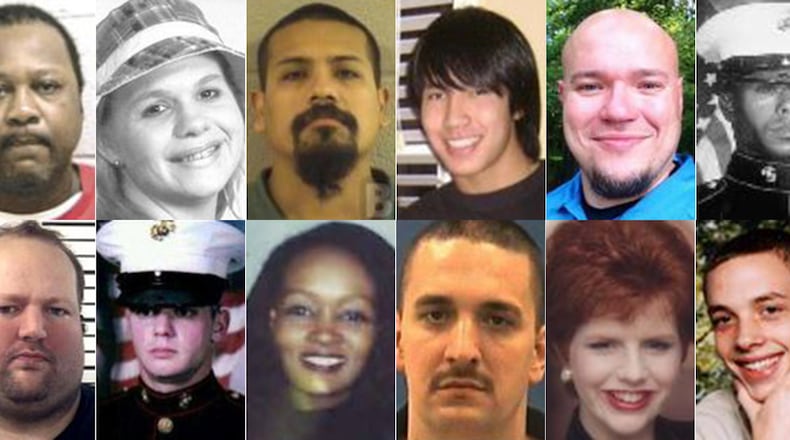How we got the story
The Atlanta Journal-Constitution and Channel 2 Action News have spent most of this year investigating police shootings. When reporters started, no one in Georgia tracked police shootings or could say how many occur each year. The AJC and Channel 2 have obtained and reviewed thousands of pages of police and court records, as well as autopsy reports, death records, and media reports to perform the most comprehensive review of police shootings in Georgia to date. For this story on how police shootings are handled in the criminal justice system, reporters also contacted district attorneys across Georgia with questions about their treatment of such cases and the grand jury process. They interviewed law enforcement officials, grand jurors, family members and experts in grand jury procedure to explore Georgia's unique privileges granted police and public officials who face potential criminal charges. To review the entire "Over the line" series, go to http://investigations.myajc.com/overtheline/.
Watch Channel 2 Action News investigative reporter Jodie Fleischer Thursday at 5 p.m. for a special installment of “Over the Line: Police Shootings in Georgia.”
Janice Puckett knew the broad outlines of the tragedy that befell her brother, Walter Folds, on April 23, 2012: A non-uniformed Griffin police sergeant shot Folds in the back of the head after chasing him through a local park.
What Puckett never knew, until contacted by reporters last month, was that a Spalding County grand jury indicted the officer for manslaughter three months later, and that the charge had stood for all of 24 hours. A day after the grand jury met, a judge threw out the indictment at the request of the local district attorney.
“It’s not right,” said Puckett. “He took a life, a life that he cannot give back.”
In five years, Griffin Sgt. Joseph Hudson is the only police officer in Georgia to be indicted for shooting a civilian, according to an Atlanta Journal-Constitution/Channel 2 Action News investigation of 171 fatal police shootings across the state from 2010 to 2015.
The case, and many others examined by the AJC/Channel 2, illustrates the wide latitude police officers have to kill in the line of duty, and it shows how heavily the justice system is weighted in their favor in the rare instances when a fatal shooting case goes to a grand jury.
The AJC/Channel 2 investigation found that:
- Not a single fatal police shooting since 2010 has gone to trial.
- Two-thirds of police shooting cases never went to a grand jury because district attorneys used their discretion not to bring charges.
- Of 48 cases that went to grand jury, only nine involved the presentation of a criminal indictment. In the rest, the prosecutor simply asked the grand jury to determine if the shooting was justified or unjustified.
Most of the cases reviewed involved officers in dangerous situations shooting and killing dangerous people. But the absence of any prosecutions points to a remarkable conclusion: As far as Georgia’s criminal justice system is concerned, police officers are always legally justified when they shoot and kill a civilian in the line of duty.
Georgia is not unique in that regard. Nationally, only 54 officers have been charged for killing a civilian out of thousands of such shootings in the past decade, according to a review by the Washington Post.
But Georgia stands alone in one respect, the AJC and Channel 2 found: It is the only state in the nation that permits police officers facing possible criminal indictment to be inside the grand jury room for the entire proceeding and to make an unchallenged statement at the end, a special privilege that does not extend to private citizens.
“That is a problem,” said GBI Director Vernon Keenan, whose agency investigates most police shootings in Georgia. “That law gives an officer certain rights, but I don’t know that it serves the interest of justice in the end.”
Grand jury proceedings are secret and not open to the public, but the AJC was able to glean certain details related to police shooting cases. In the nine cases where district attorneys presented an indictment — roughly five percent of all fatal police shootings — the AJC identified eight where the officer was present in the grand jury room under Georgia’s special provision. The district attorney in the ninth case did not respond to questions.
In several cases where grand jurors or prosecutors confirmed that officers testified, the AJC and Channel 2 found evidence that the testimony played a factor in the outcome.
That was true in the case of the Euharlee officer who shot Christopher Roupe, an unarmed 17-year-old high school student, when the officer came to Roupe’s home looking for his father. A non-criminal grand jury found the officer’s actions unjustified. A criminal grand jury later voted not to indict the officer.
The officer did not testify in the first grand jury, but did in the second.
The testimony of Union City Police Officer Luther Lewis played a significant role in two different criminal grand juries, with each grand jury choosing not to indict Lewis in the 2011 shooting death of 19-year-old Ariston Waiters, according to Fulton County District Attorney Paul Howard. Lewis gave lengthy, emotional statements to both grand juries, and Howard believes it cost him the case.
“You can imagine being able to give a statement without cross-examination,” Howard said. “It’s really a powerful weapon.”
Sgt. Hudson was the only officer who both testified at his grand jury and was indicted anyway, the AJC and Channel 2 found. But his case never went to trial because the local district attorney exercised the wide authority Georgia grants prosecutors and appealed to a judge to have the case dismissed.
“I would have prosecuted if I thought there was proof beyond a reasonable doubt,” said Spalding County District Attorney Scott Ballard.
Some in law enforcement say the special privilege afforded officers in the grand jury protects them from unwarranted prosecution, runaway grand juries or unscrupulous prosecutors.
“We are the only people that go head-long into danger, with people who are armed, wanting to kill us or kill somebody else,” said Putnam County Sheriff Howard Sills, the past president of the Georgia Sheriffs’ Association. “And I think we should be afforded something in that regard.”
Read the AJC’s complete investigation in Sunday’s Atlanta Journal-Constitution and on MyAJC.com.
About the Author
The Latest
Featured



